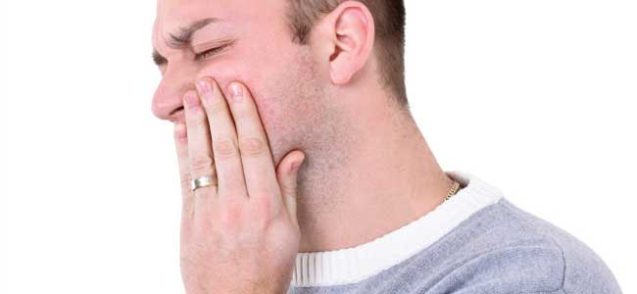Ouch! Maybe it’s a fresh smoothie, a spoonful of ice cream, or even just a sip of ice water—but there it is, throbbing tooth pain.
There are many reasons why you might be experiencing tooth sensitivity to cold. Fortunately, you can take several steps to remedy this yourself, including checking with your dentist.
Other symptoms often accompany sensitivity to cold, including:
- Sensitivity to hot foods
- Pain when biting or chewing
- Persistent dull or throbbing tooth pain
But what conditions cause these kinds of tooth sensitivity?
Exposed Roots
Tooth enamel, the hardest substance in your body, covers your tooth above the gumline. However, the root of your tooth, the part normally covered by your gums, does not have this protective layer. If you don’t brush and floss regularly—or if you brush and floss too vigorously—your gums may recede, exposing the roots of one or more of your teeth.
If you have exposed roots, the best course of action is to follow general oral hygiene. Continue brushing and flossing, but use a soft toothbrush and fluoride toothpaste specifically made for sensitive teeth. If the pain continues, though, make sure to see your dentist.
Tooth Decay
Small cavities can also become sensitive to cold food or drinks. Cavities occur in the enamel itself, and expose the nerve inside your tooth to cold, heat, and other sources of discomfort.
While you should continue flossing and brushing, you should see a dentist to diagnose and treat your condition. If the cavity is small, a dentist can remove the decayed area and fill the tooth. If it’s more serious, you may need a root canal to clean out the decay, disinfect the root, and seal the tooth.
Sensitivity after Dental Work
Sometimes dental work can temporarily cause your teeth to become sensitive to cold or hot foods, from a few days to a week or longer if you’ve had a filling or a crown placed.
In these cases, over the counter pain relievers like aspirin, acetaminophen, or ibuprofen should bring you relief. But if the pain persists or worsens, definitely contact your dentist!
How Can I Get Rid of Tooth Pain?
In general, you can address temporary tooth sensitivity to cold with the standard elements of good oral hygiene: regular brushing and flossing, as well as routine preventive care visits to your dentist. Consider using toothpaste specifically made for sensitive teeth or adding a fluoride mouth rinse to your daily routine.
However, if your sensitivity lingers, it could indicate that you have a more serious dental condition. The pulp—the interior of your teeth—could be damaged, either from long-term tooth decay or an injury. It’s important to see a dentist before you develop an infection that could put your tooth at risk.
If you have any concerns over increased or recent tooth sensitivity to cold—or heat— Douglas B. Weber, DDS is always here to help. Make an appointment and get your tooth checked out before it has a chance to turn into something more serious.
More

Survive Allergy Season
Making the Best of Your Summer and Fall
For most parts of the country, summer and early fall are often filled with outdoor adventures. From enjoying the local water hole and hiking to classic barbecues and playing your favorite lawn game, the fun is endless. However, according to the American College of Allergy, Asthma and Immunology, for more than 23 million Americans, nature has created a buzzkill: ragweed. Ragweed may not be that person who signs up to bring only napkins and plastic cups to your barbecue, but the allergy symptoms of ragweed (hay fever) can make your eyeballs feel like an overfilled balloon. While the symptoms of hay fever can be merely uncomfortable and a nuisance, there are instances in which they can significantly hinder your daily life.
Hay fever includes the following symptoms:
- Itchy eyes and throat
- Nasal congestion
- Sneezing
- Runny nose
- Hives
- Coughing
If left untreated, symptoms can escalate to a sinus infection. Sinus infection symptoms can include facial pain, congestion, bad breath, coughing, and dental pain.
How to Fight Back
There are a few medicines, remedies, and practical tips you can use to help relieve symptoms and prevent hay fever altogether.
- Antihistamine: This is your typical allergy medicine. Some examples of over-the-counter brands include Allegra, Zyrtec, and Claritin. Before you use any new medicine, check with your physician to ensure it won’t interfere with anything else you may be taking or an existing health condition.
- Decongestant: This medicine will help if you are congested (facial pain, stuffy nose, and headaches). Sudafed and Afrin are a couple medicines that can help. Again, check with your physician before taking a new medicine.
- Humidifier: Keeping the air in your living space warm and humid can help relieve the symptoms of your allergies. Warning: If you are allergic to indoor nuisances (such as dust mites), using a humidifier can actually make your symptoms worse.
- Stay inside: Check your local weather for pollen counts and windy days. These are good indicators of when you should avoid being outside. If you’re using your air conditioner, it also helps to use a high-efficiency particulate air (HEPA) filter to prevent pollen from getting in.
- Allergy shots (immunotherapy): If you have tried other medicines and nothing seems to work, your physician may propose taking allergy shots. This is a series of shots that slowly allows your body to acclimate to the allergen causing your symptoms.
When to See a Dentist
If you have sinus infection and one or more of your upper teeth hurt, this is likely due to your maxillary sinus cavity not being able to drain properly. This puts pressure on your teeth, causing pain. While a sinus infection can be the cause of your tooth pain, your teeth may also be the cause of your sinus infection. If you deal with allergies, it may be hard to determine the cause of the pain in your teeth.
If you have a prolonged toothache, it is recommended that you go to your local dentist for an examination. A dentist will be able to determine whether there is an issue with your mouth that is causing your pain. If they do not find anything notable in their examination, they may refer you to a physician who can further assist you.
If you have had tooth pain with or without a sinus infection, call Douglas B. Weber, DDS today to schedule an exam with your Lancaster, CA dentist.
Sources Cited
“Allergic Rhinitis.” (n.d.). Retrieved July 28, 2016, from http://www.healthline.com/health/allergic-rhinitis#1.
“Allergies.” (2011). Retrieved July 28, 2016, from http://www.cdc.gov/healthcommunication/ToolsTemplates/EntertainmentEd/Tips/Allergies.html.
Feature, D. F. (n.d.). “Ragweed Pollen and Fall Allergies.” Retrieved July 27, 2016, from http://www.webmd.com/allergies/features/ragweed-pollen.
“Ragweed Allergy.” (2015). Retrieved July 28, 2016, from http://acaai.org/allergies/types/ragweed-allergy.
“The Causes of a Sinus Tooth Pain.” (n.d.). Retrieved July 27, 2016, from http://crest.com/en-us/oral-care-topics/tooth-pain/the-causes-of-a-sinus-tooth-pain.
“What’s the worst season for allergies? (2011)”. Retrieved August 03, 2016, from http://health.howstuffworks.com/diseases-conditions/allergies/outdoor-allergies/worst-season-for-allergies.htm.
More
 Anytime you have a toothache, the first thing most people do is seek an over-the-counter (OTC) pain reliever. While this may provide some temporary relief, to discover the cause of your toothache and the right treatment, you will need to see a dentist. Dr. Weber in Lancaster, CA will determine the exact cause of your pain in order to prescribe the best treatment plan for you. Dr. Weber will determine if the problem is due to decay or trauma to a tooth involving the central pulp tissue containing the nerve which is the most common cause for severe toothaches. This will require endodontic (“endo” = inside, “dont” = tooth) treatment or what is commonly referred to as a root canal treatment, which will remove the pain and allow you to keep the tooth.
Anytime you have a toothache, the first thing most people do is seek an over-the-counter (OTC) pain reliever. While this may provide some temporary relief, to discover the cause of your toothache and the right treatment, you will need to see a dentist. Dr. Weber in Lancaster, CA will determine the exact cause of your pain in order to prescribe the best treatment plan for you. Dr. Weber will determine if the problem is due to decay or trauma to a tooth involving the central pulp tissue containing the nerve which is the most common cause for severe toothaches. This will require endodontic (“endo” = inside, “dont” = tooth) treatment or what is commonly referred to as a root canal treatment, which will remove the pain and allow you to keep the tooth.
Just make sure you don’t let a toothache go untreated too long, you want to pinpoint the problem before it gets worse. If you are unsure of what you are feeling, contact the dental team at Douglas B. Weber D.D.S. in Lancaster, CA as soon as possible so you can get back to enjoy a pain-free life.
More



